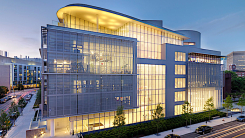Nursing can be a great career choice, as there is still considerable demand for nurses in general. Many nurses describe their jobs as fulfilling, challenging, and offering great flexibility in location and scheduling. Boston is an ideal location for nursing schools because it has so many world-class hospitals, and many colleges send their students to those hospitals for clinical rotation.
Nursing training can range from one year for a basic certificate and up to six or eight years for a master's-level NP or doctorate degree.
Nurses generally work in doctor's offices, hospitals, or schools, and many nurses focus on one of many specialized areas. For example, cardiovascular nurses care for patients with heart disease or for patients who have had heart surgery. Critical care nurses, on the other hand, work in intensive-care units in hospitals, providing care to patients with serious, acute illnesses and injuries. Rehabilitation nurses care for patients with temporary or permanent disabilities.
Nursing Degrees from Boston Nursing Schools
Boston nursing schools offer a broad range of degree programs, including:
-
Practical Nursing Certificates: This takes about one year to complete and allows you to become licensed as a Licensed Practical Nurse (LPN). LPNs take care of patients under the direction of a doctor or registered nurse and most often work in homes, doctor’s offices, rehab centers, or nursing homes. Examples of Boston area colleges that offer these degrees are Quincy College, Northern Essex Community College, and Roxbury Community College.
-
Associate Degree in Nursing (ADN): This takes about two to three years to complete and entitles you to take the national board examination to become a licensed registered nurse (RN). Once licensed, RNs generally work in hospital settings, clinics, doctor’s offices, rehab centers, or schools.
-
A bachelor’s degree in nursing (BSN) takes about four to five years to complete and entitles you to take the board examination to become a registered nurse (RN). As an RN, you are responsible for patient care and education. It is also a stepping stone for specialized nursing professions or an advanced degree. Once licensed, RNs generally work in hospitals, clinics, doctor’s offices, rehab centers, or schools. Many hospitals now require a BSN degree to be employed as an RN. Many colleges offer special programs that allow nurses with an ADN degree to earn a BSN degree. The Boston Area College that offers ADN degrees is Bunker Hill Community College.
-
A Master's Degree in Nursing (MSN) takes about two years and opens up several career options, such as becoming a nurse practitioner, nurse anesthetist, or clinical nurse specialist in areas such as acute care, adult care, family care, geriatrics, neonatal care, palliative care, pediatrics, psychiatric care or obstetrics and gynecological nursing, Northeastern University, and Simmons College.
-
A Doctor of Nursing Practice (DNP): This degree opens up job opportunities at the highest level of health care delivery. After graduating from the DNP program, you will be able to take on a leadership role in clinical practice, apply your skills in administration, or combine teaching with clinical practice. Similarly, DNS (Doctor of Nursing Science) and the research-focused PhD are doctoral degrees granted by some schools. Examples of Boston-area colleges that offer these degrees are the University of Massachusetts and Boston College.
Another popular path into the nursing profession are the accelerated nursing programs available at many colleges. These programs allow students with a bachelor's degree in a non-nursing subject to earn a BSN in as little as three semesters. Other accelerated programs use the same path but result in a master's degree in nursing, including Nurse Practitioner (NP).
Boston Nursing Schools - Tuition, Size, Location and Degrees
Following are the nursing schools in Boston comparing tuition, size, location and the type of nursing degrees offered. The schools are listed in the order of size, not rank. Please click on the name of the school for more information.
| School | Tuition | Selectivity | Size | Location | Nursing Degrees |
| Northeastern University | Popular: Registered Nursing, Nurse Anesthetist |
||||
| University of Massachusetts | Popular: Nursing Science,, Registered Nursing, Nursing Practice |
||||
| Boston College | Popular: Registered Nursing |
||||
| Salem State University | Popular: Registered Nursing |
||||
| Bunker Hill Community College | Popular: Medical/Clinical Assistant, Surgical Technologist, Nursing Assistant, Rdiology Technologist, Medical Records, EMT |
||||
| North Shore Community College | Popular: Medical/Clinical Assistant, Substance Abuse Addiction Counseling, Psychiatric/Mental Health Services Technician |
||||
| Northern Essex Community College | Popular: Medical Office Assistant, Polysomnography, Clinical/Medical Laboratory Technician |
||||
| Framingham State University | Popular: Nursing Education |
||||
Popular: Registered Nursing, Ultrasound Technician, Dental Hygenist, MRI Technicia, Radialogy Technician, Nuclear Medical Technician |
|||||
| Simmons College | Popular: Registered Nurse, Physical Therapist, Nursing Practice, Nursing Education, Nursing Administration, Family Practice Nursing |
||||
| Quincy College |
|
||||
| Endicott College | Popular: Registered Nursing, Nursing Science, Family Practice Nursing, Nursing Administration |
||||
| Curry College | Popular: Registered Nursing |
||||
| Emmanuel College | Popular: Registered Nursing, Clinical Nurse Leader |
||||
| Roxbury Community College | Popular: Nursing, Radiology Technician |
||||
| Regis College | Popular: Registered Nursing, Radiology Technician |
||||
| Labouré College | Popular: Registered Nursing |
Job Market for Nurses in the Boston Area
Long-term job prospects for Boston nurses are excellent. As a matter of fact, the government labor forecast predicts an increase of nursing jobs of 20% nationwide between 2010 and 2020. This increase is attributed mainly to the aging Baby Boom generation and their increased need for health care. Another reason for the strong demand for nursing is due to the fact that medical technology is advancing so fast and as a result more highly trained nurses will be required. Boston with its many great hospitals and research facilities is a great place for nursing jobs.
Even with excellent long-term job prospects for nurses, hiring can be competitive in some cases. Especially new graduates who start out in the business need to use smart job searching skills to find the right position. Considering different sources of nursing jobs such as long-term care facilities, schools or corporations can prove a winning strategy.
Salaries for Nurses in the Boston Area
Salaries for nurses in Boston are generally higher than you would find in more rural areas.
Source: Mass.gov















































